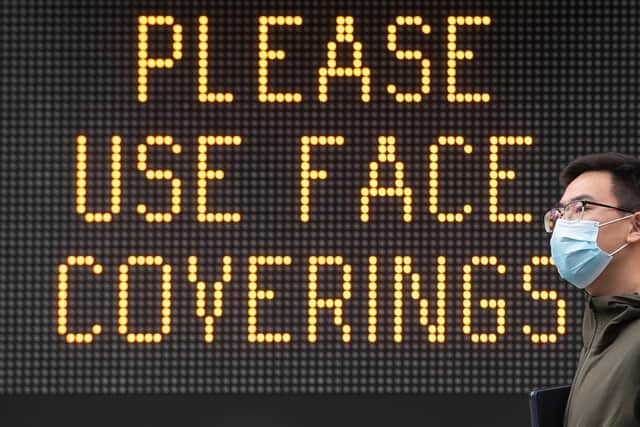Local coronavirus lockdowns could lead to riots amid rich-poor divide, adviser warns
This article contains affiliate links. We may earn a small commission on items purchased through this article, but that does not affect our editorial judgement.
Professor Clifford Stott, a member of the Scientific Advisory Group for Emergencies (Sage) sub-committee on behaviour, said mass job losses and rising unemployment due to coronavirus, as well as concerns about racial and economic inequality, may all be factors which could fuel “confrontations” in the coming months as the coronavirus crisis continues.
And a possible divide between poorer and more affluent areas brought on by local lockdowns – if brought into force – could also have an effect, the professor of social psychology at Keele University, who has advised the Home Office on public order strategy, warned.
Advertisement
Hide AdAdvertisement
Hide AdJoin our new coronavirus Facebook group for the latest confirmed news and advice as soon as we get it


It comes as Downing Street yesterday insisted the R rate - the rate of virus transmission - across the country remained above one, meaning the virus could spread.
But figures from Public Health England (PHE) and the University of Cambridge claimed in the North West, this has risen above one, leading to discussions about local lockdowns previously discussed by ministers.
Pushed on how decisions could be taken on these when information released had been on the basis of regions covering hundreds of miles - for example the North East and Yorkshire in one category - the Prime Minister’s spokesman said the new Joint Biosecurity Centre would produce more granular detail.
Advertisement
Hide AdAdvertisement
Hide AdHe said: “That is the purpose of the Joint Biosecurity Centre, it exists to carry out that analysis at a very localised level”.
But the Department of Health and Social Care said last week the centre would not be operating at full capacity until later in the summer.
And Prof Stott warned localised lockdowns could become “very, very problematic” for police officers if the rules mean people living in poorer areas are more likely to face tougher restrictions than those in affluent neighbourhoods.
Enforcement generally has become “pretty impossible now to a large extent” as lockdown measures are eased, apart from for large-scale public gatherings, the professor said.
Advertisement
Hide AdAdvertisement
Hide AdThe danger, he warned, is some of the gatherings are “probably very likely” to be groups of young men on working class estates which could then attract more police attention, adding: “I think that could create a circumstance when lots of young men feel it’s unfair about what’s happening to them.
“And where the police try to enforce that unfairness, it could create a breakdown in social cohesion, lead to a sense of unfairness in policing.
“We know that those factors are often drivers for social conflict.”
Circumstances in the UK will change “quite considerably” in the coming months as a result of the coronavirus pandemic, Prof Stott said, adding: “There are important issues about inequality that could, if not dealt with properly, feed into a situation in the future over the summer months where confrontations develop.”
Advertisement
Hide AdAdvertisement
Hide AdA rise in Covid-19 transmission rates forcing the country back into lockdown again when people are “significantly economically disadvantaged” could also “increase dissent about the conditions of people’s lives”, he added.
He said: “I think in the worst case scenario it’s not inconceivable that we could have disorder on a scale equivalent to August 2011 [during the London riots sparked by the police shooting of Mark Duggan].
“What we need to do is to make sure we start addressing the underlying causes now, so that the conditions that led to the 2011 riots are not in place should we get a precipitating incident.
“Put simply, the most effective thing that the police can do is put bobbies on the beat.”
-------------
Advertisement
Hide AdAdvertisement
Hide AdEditor’s note: First and foremost - and rarely have I written down these words with more sincerity - I hope this finds you well.
Almost certainly you are here because you value the quality and the integrity of the journalism produced by The Yorkshire Post’s journalists - almost all of which live alongside you in Yorkshire, spending the wages they earn with Yorkshire businesses - who last year took this title to the industry watchdog’s Most Trusted Newspaper in Britain accolade.
And that is why I must make an urgent request of you: as advertising revenue declines, your support becomes evermore crucial to the maintenance of the journalistic standards expected of The Yorkshire Post. If you can, safely, please buy a paper or take up a subscription. We want to continue to make you proud of Yorkshire’s National Newspaper but we are going to need your help.
Postal subscription copies can be ordered by calling 0330 4030066 or by emailing [email protected]. Vouchers, to be exchanged at retail sales outlets - our newsagents need you, too - can be subscribed to by contacting subscriptions on 0330 1235950 or by visiting www.localsubsplus.co.uk where you should select The Yorkshire Post from the list of titles available.
Advertisement
Hide AdAdvertisement
Hide AdIf you want to help right now, download our tablet app from the App / Play Stores. Every contribution you make helps to provide this county with the best regional journalism in the country.
Sincerely. Thank you.
James Mitchinson
Editor